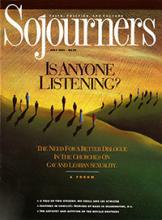A few months ago, I was a reluctant participant in a parish workshop whose stated aim was to make us feel good about ourselves. The leader warned that he'd start by asking each of us to make one positive statement about ourselves. First, though, we celebrated a Eucharist. The gospel reading -- taken from that day's lectionary -- was Luke's story of the pharisee who made a lot of positive statements about himself, and the tax collector who simply begged, "Have mercy upon me, a sinner." Jesus' conclusion: "All who exalt themselves will be humbled, but all who humble themselves will be exalted."
The leader noted the coincidence -- if it was one -- but only to say that we too often use that story as a stick to beat ourselves up. The challenge he evaded -- to wrestle with the contradictions between the message of scripture and the assumptions of our liberal, psychological, individualistic culture -- is gleefully taken up by Stanley Hauerwas and William Willimon in Resident Aliens: Life in the Christian Colony.
There's something to offend just about everybody in this book. And that's obviously the way its authors want it. It takes a combative pair to rest their case, as these two divinity school professors do, on the story of Ananias and Sapphira and Paul's advice in Ephesians to "put on the whole armor of God."
Hauerwas and Willimon's main premise is that the end of the Constantinian era is the best thing that's happened to Christianity since the resurrection. The fact that we now live in a secular culture, largely hostile to the claims of the gospel, is, they say, very good news indeed. And what they offer in their book is a picture of what life in the new, post-Constantinian church could be.
Read the Full Article
